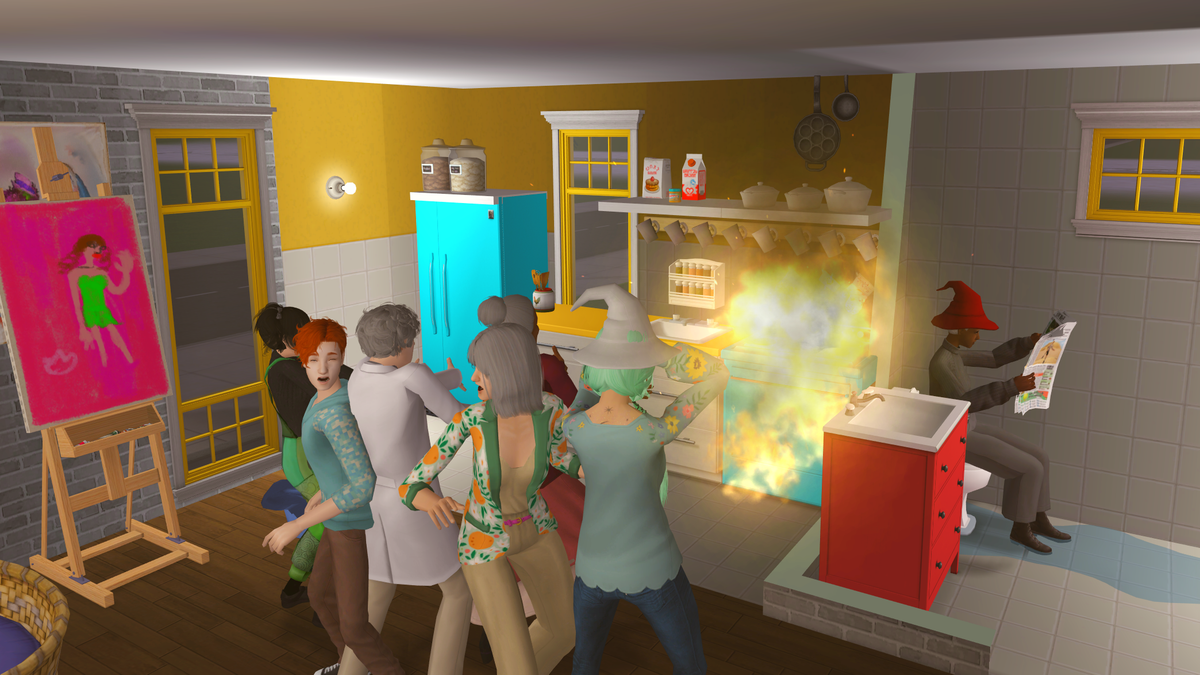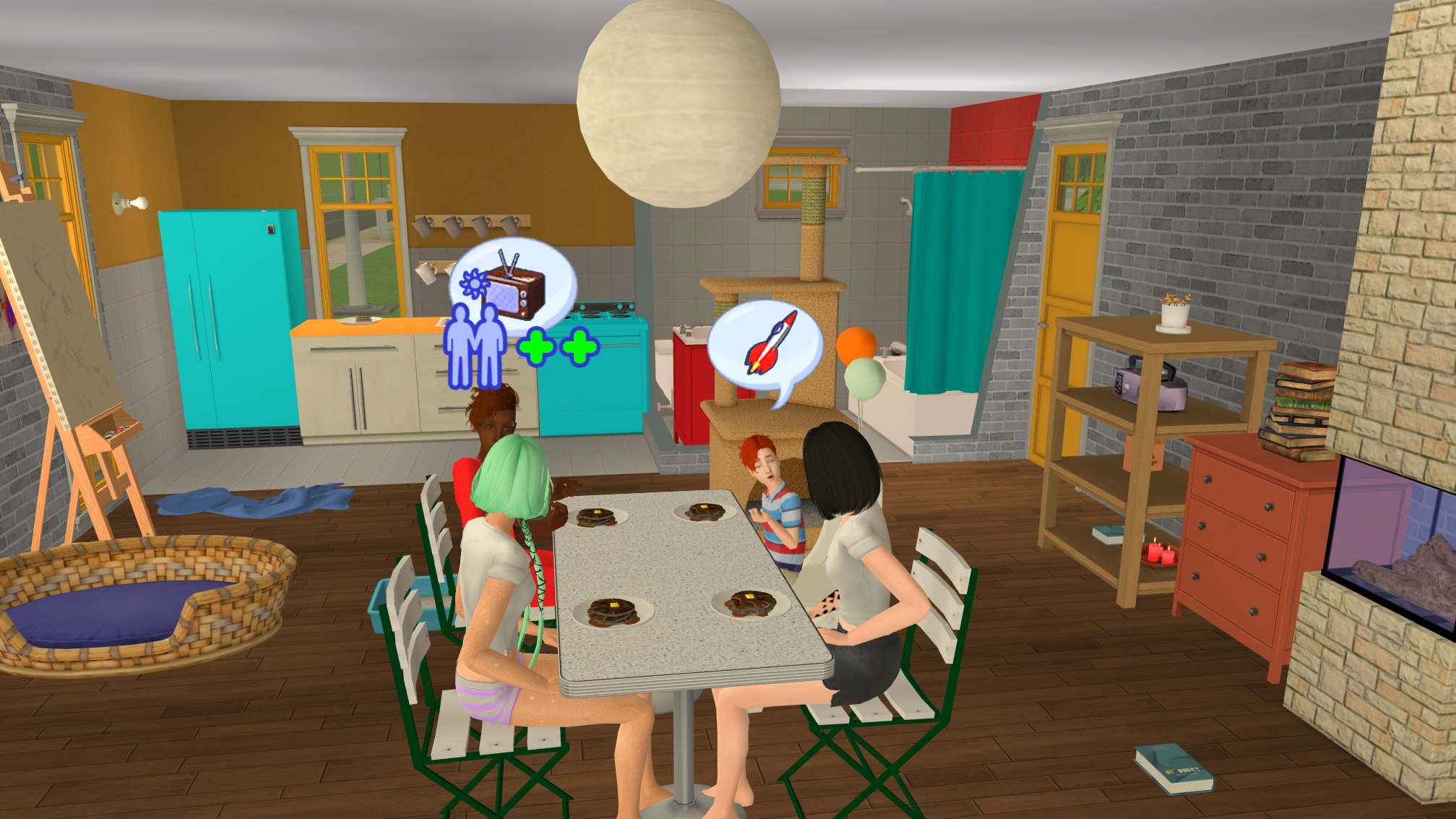Levels of abstraction: Why I still play The Sims 2

This month marked the 21tst birthday of my favorite city building game of all time: The Sims 2. I know it isn't normally thought to fall into the same genre as games like SimCity or Cities: Skylines – rightfully so! It has quite a different focus, one that makes it a much better playground than most other city builders for the kinds of things I want to explore when building a digital city.
For a long time, I thought myself the kind of person that should, in theory, enjoy city building games a great deal. I like games that I can put a lot of hours into, I like games that allow me to create something, and if there's one thing I'm fascinated with, it's cities. I'm fascinated by how we shape spaces where a ridiculous number of us choose to live with each other, beside each other, stacked on top of each other – and how the space in turn shapes us, and how we shape it back, and so on. It is this fascination that draws me to city building games, and it is also what always ends up making me put them down.
I have picked up a number of city builders over the years. Each one, I have approached with the same hopeful excitement, only to find myself losing interest in the game shortly after. For years I was puzzled by this and I assumed the reason to be somewhere external to the game itself. That I picked it up at a bad time, when real life ended up getting in the way. That I didn't have enough time or energy to commit to a complex game. Or that I was somehow playing it wrong. It took me a good while to realize that I was in fact pumping hundreds and thousands of hours into a city builder. I just found my city builder in a game that wasn't typically thought to fall under that genre term.
To say that I like The Sims 2 wouldn't even begin to do it justice. The Sims 2 is the single game that I have played the most throughout my life so far – in terms of sheer hours, surely, scattered over a handful of different computers (among them the very first computer I owned, an oversized, 4kg beast of a laptop that kept crashing and caused me a lot of grief, but was able to run The Sims 2 quite fine). But also in terms of how consistently I have come back to the game over and over, from when I started playing it as a teenager shortly after it came out in 2004, all the way until now. There is no other videogame that I have played consistently, with gaps, but no permanent end, for two decades and counting.
As a teenager, I played The Sims 2 like most other teenagers do, deleting pool ladders and blushing upon accidentally triggering a particular cutscene – we all know the drill. But as I grew older, my playstyle started changing toward a more city-oriented playstyle, my interest shifting from the lives of a handful of characters to the life of a whole community. More and more, it began to scratch the urge that "real" city building games could never fulfill for me: It became a tool for me to explore what it means for somewhere to be a good place to live.
It was really Paolo Pedercini's talk "SimCities and SimCrises" that helped me put words to my vague feeling that The Sims 2 could scratch this itch for me, while other city builders couldn't. Pedercini's talk is an analysis of how ideologies have become encoded into the design of city builders, many of which have turned into genre conventions as newer titles have copied features from an original without questioning their underlying biases. This is a topic quite close to my heart – and some of the problems Pedercini points out are at the root of why most city builders never quite work for me.
The problem is a problem of abstraction. City builders are complex games, but they are typically uninterested in the complexity of the individual life – lives are reduced to numbers, their realities subsumed in charts and lists. With this, city builders consistently abstract away precisely the things that I find so interesting about cities: the effects of their configuration on the lived realities of their inhabitants, the interplay and conflict between individual and collective interests. This is what I want to see play out, and it is what city builders do not provide.
For one thing, despite their name, I don't find city builders to be very much about building at all, at least not in the way I find interesting. At its most abstract, building in a city builder may be reduced to the player defining "zones", and buildings accordingly sprouting on their own. Even when the player gets to place individual buildings directly, those are usually based on a few pre-defined templates, and there is little possibility to experiment with the effects of the particular layout of a building on those inhabiting it. This, you guessed it, is exactly the aspect of building that makes building in a videogame interesting to me.
In The Sims 2 (presumably also the other titles of the series, but I haven't played those very much), I can experiment with exactly that. I can directly and precisely control the design of the space my sims inhabit, and then see how my choices affect their living conditions. I can stick to the suburban, single-family homes that the game shipped with, or I can come up with different living arrangements. In my current city-building project, I've had a large group of adult friends live together in one big house. They each got their own little bedroom, and then a large community area with a kitchen and living space. There was a lot of mingling, many parties, and their friends from across the street were visiting constantly without my having invited them. At one point, one of the adult sims adopted a child and I was delighted to watch the child develop close bonds with each and every adult living in the same house, with quite little prompting from me. The child essentially gained a whole bunch of bonus parents involved in their upbringing, who'd make them dinner, read to them, or help them with their homework. Other children from the same neighborhood, who lived in a nuclear-family home, didn't develop any close relationships with adults beyond their parents, and the parents seemed constantly overwhelmed with the many responsibilities that come with raising a sim child. An unintended side effect of the way I had designed their living spaces.

And it's not just the living spaces I am interested in designing: In my TS2 neighborhood, I place great importance on public infrastructure. The first community facility I built in my current city was a little park with a playground, to give my sims somewhere to relax, play, and meet their neighbors. Next was a townhall which I designed as a gathering place for everyone to use, with a room for meetings and another one for parties and hangouts. The meeting room is important in my game because I've been experimenting with giving my sims more say in what I should build for them. So far my approach has been to gather them at a table and watch their conversations, taking the topics they talk about as cues as to what they would like to see in their town. Going into the first such meeting, I had a lot of ideas for what to build, but my sims kept bringing up clothing in the conversation. So I made it a priority to move in a new sim to become the town's tailor.
Policy is important in my personal game of The Sims 2. Not only how it is enacted, but also how it affects the city's inhabitants. Again, it is the details that I am interested in, more detail than a typical city builder will usually provide. As Paolo Pedercini criticizes, the effects of policy in many city builders are reduced to simple formulas such as "taxes up, population happiness down" – no matter what infrastructure tax revenue may allow to build. I find such gross oversimplifications uninteresting. What I want to do in a game is to experiment with different kinds of tax policy and the details of its implementation.
The Sims 2 doesn't come with a built-in tax system, but the game has a now-small, but still-thriving community of hardcore players who have come up with ways to implement complex economic and social systems using a combination of mods, cheat codes, and spreadsheets. This allows me to play out what policy means for sims' lives in a much more nuanced way than trivial "more tax, less happy" determinism allows. I started with the most basic tax system I could come up with, by taxing any income my sims earned at 50%. Tax money was paid into the town's treasury, where it was then available to pay for infrastructure. Soon, some of my sims struggled more than others because they held jobs earning a lower wage, or because they had small children to provide for. A tax rate being too high for certain sims then wasn't a result of an arbitrary threshold put there by some designer, it was a realization I came to upon watching some of my sims not being able to put food on the table. On the other hand, I can observe the effects of being able to buy infrastructure that benefits the inhabitants of my city collectively. I mentioned the park and the townhall, next up may be a library, a museum, or a public pool.
This playstyle opens up all kinds of possibilities that, with the help of my mods and spreadsheets, I will be able to explore. How could I implement tax brackets, for example, or a child tax credit? And what infrastructure could taxes allow me to afford – a daycare system perhaps, or universal basic income? Because The Sims 2 is so detailed in showcasing the lives of imaginary little people, their "happiness" becomes something much more nuanced than a single number could convey. It motivates me to find ways to run my little sim society in a way that allows all sims to thrive, not just a lucky few.
Does this make The Sims 2 any more realistic or any less biased than other city-building games? No. Anyone who has witnessed one of their sims be killed by a swarm of flies will know that The Sims 2 isn't particularly subscribed to realism. And anyone who has wondered why the game, when sims have children, grants parental leave only to the mother (let alone offering daycare as an option), will know that the game is not without biases (though this particular flaw is nothing that a mod couldn't fix). But it operates at a different level of abstraction than regular city builders: its cities are populated not by numbers, but by people. That allows me to experiment with thoughts and inner conflicts that I grapple with. It becomes a space for negotiation and reflection. This, I think, is a huge part of why The Sims 2 manages to pull me back again and again, even twenty-one years after its release. Happy belated birthday, you weird, delightful game.
